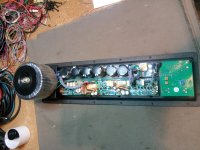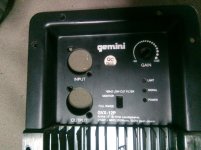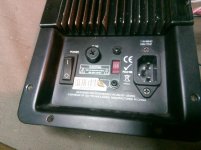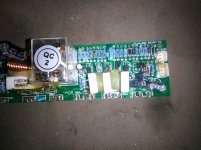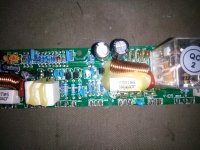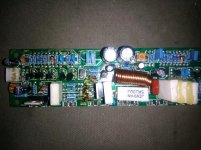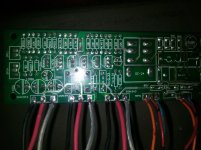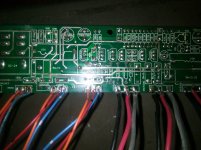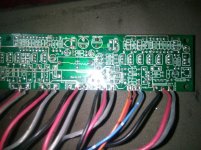Hello Guys.
I have a Gemini GVX-12P powered floor monitor that makes random popping noises when turned on. The noise does not disappear when it warms up. Any idea what to look for?
I noticed that the pcb with the input connectors has already dried out moisture traces on its solder side, maybe the amp pcb has them too, but I'll have to disassemble it first to be sure.
But I don't know if this has anything to do with the popping...
It seems to be impossible to download the user manual for these monitors, since my internet is too damn slow at the moment. I cannot find any schematics for these monitors.
Thanks in advance...
I have a Gemini GVX-12P powered floor monitor that makes random popping noises when turned on. The noise does not disappear when it warms up. Any idea what to look for?
I noticed that the pcb with the input connectors has already dried out moisture traces on its solder side, maybe the amp pcb has them too, but I'll have to disassemble it first to be sure.
But I don't know if this has anything to do with the popping...
It seems to be impossible to download the user manual for these monitors, since my internet is too damn slow at the moment. I cannot find any schematics for these monitors.
Thanks in advance...
I checked all caps on the PSU section with a LED and variable supply voltage. There was one suspicious cap, but after rechecking they all seem to be OK. The preamp and crossover section is a different story.
In your experience, witch caps are more prone to leak, the big ones in the PSU or the little ones in the power transistor and crossover section?
In your experience, witch caps are more prone to leak, the big ones in the PSU or the little ones in the power transistor and crossover section?
I received another Gemini GVX-12P that did not turn on. It happened to be the main power switch, dirt got between the contacts...
Now, since I have two of these power monitors, I swapped the PSUs and the preamp PCBs and the noise is still there. That would narrow it down to the main amp board.
I took the amp board out (pain in the butt, I'm not going into detail here) and checked all caps with a LED for leakage. Only one was suspicious so I put a new one in but the noise is still there.
Now I'm left with two trimpots to check (these are covered with glue, on purpose), and resoldering all the main traces on the board.
Any ideas what else to check?
I still could not find the schematics anywhere on the internet.
Now, since I have two of these power monitors, I swapped the PSUs and the preamp PCBs and the noise is still there. That would narrow it down to the main amp board.
I took the amp board out (pain in the butt, I'm not going into detail here) and checked all caps with a LED for leakage. Only one was suspicious so I put a new one in but the noise is still there.
Now I'm left with two trimpots to check (these are covered with glue, on purpose), and resoldering all the main traces on the board.
Any ideas what else to check?
I still could not find the schematics anywhere on the internet.
That would narrow it down to the main amp board.
PhantomBox, some photos may be helpful.the pcb with the input connectors has already dried out moisture traces on its solder side,
 Thread moved to solid state.
Thread moved to solid state.A popping noise can also be associated with insipid instability not uncommon in radio circuits , on an oscilloscope trace an inputted sine wave appears okay but occasionally a "balloon " appears on the signal.
Could be a faulty small value capacitor but no schematic .
Could be a faulty small value capacitor but no schematic .
Today I put a scope to it (someone lent me his oscilloscope he uses for automobile diagnostics). I could see a sine wave all the way but I have no clue of what exactly to look for. Nor how to interpret it.
Here are some more pics and an audiofile with the noise produced by this amp.
Here are some more pics and an audiofile with the noise produced by this amp.
I listened to the noise zip it sounds like a "breaking up " or bad connection of (usually ) a resistor but a signal path capacitor could cause it.
If it was just instability it would be less of a "ping " and more of a "plop" (rounded ) .
To justify that connect your oscilloscope and check the noise floor without a signal first .
Look for sharp pointed spikes , they might be small or hard to see and if your oscilloscope cant filter down to that level use a THD meter.
How thick is the noise on the trace ?
If it was just instability it would be less of a "ping " and more of a "plop" (rounded ) .
To justify that connect your oscilloscope and check the noise floor without a signal first .
Look for sharp pointed spikes , they might be small or hard to see and if your oscilloscope cant filter down to that level use a THD meter.
How thick is the noise on the trace ?
Sorry it took me so long to get back on the issue.
I got another scope today, simpler than the previous but it still needs a laptop to see what's going on.
The noise appears on the LF driver only, so this narrows it down a little bit more.
I put one probe on the input and the other on the LF speaker output. I got my readings and the spikes were quite visible, as "in you face". I can't tell you how much "in your face" because laptop's battery died just then.
By "How thick is the noise on the trace ?" what do you mean exactly?
I got another scope today, simpler than the previous but it still needs a laptop to see what's going on.
The noise appears on the LF driver only, so this narrows it down a little bit more.
I put one probe on the input and the other on the LF speaker output. I got my readings and the spikes were quite visible, as "in you face". I can't tell you how much "in your face" because laptop's battery died just then.
By "How thick is the noise on the trace ?" what do you mean exactly?
Almost forgot: a bad connection on a resistor or a signal path capacitor means that I just should resolder the connection leads or do I have to replace the component?
I asked about the noise level in case the spikes were below the noise floor ,as they aren't caused by the output but on the driver only there I would concentrate on checking the components round that area.
Check for overheating resistors that feed the driver and any capacitor feeding the driver.
Check for overheating resistors that feed the driver and any capacitor feeding the driver.
Last edited:
Hello again.
It takes a while for me to come back on the issue 'cause it takes so long for the components to get here. A few years ago you could buy them almost at the next supermarket (exaggerating...), now you have to search the internet and buy from whoever is offering them. I bought them at the other side of the country. And yes, I live in Venezuela...
So far, I replaced all electrolytic caps, all oher small caps, the bulky cement type 0.33R 5W resistors that are feeding the drivers. I resoldered all connecting points. Twice! The only thing that I haven't changed so far are the transistors because the all checked OK and some 0.33 ohm 1/2W resistors that are also attached to the drivers.
I had a hunch that the problem might be the cement resistors because the noise disappeared when I wiggled one of them, but it soon came back.
Tomorrow I will buy these resistors. The cement type were 0.33 ohm, and the 1/2W resistors mounted on the PCB are also 0.33 ohm. I can get these in 1 ohm 1/2W, the original value is unavailable.
I don't think the difference in ohm would be an issue. Or would it?
It takes a while for me to come back on the issue 'cause it takes so long for the components to get here. A few years ago you could buy them almost at the next supermarket (exaggerating...), now you have to search the internet and buy from whoever is offering them. I bought them at the other side of the country. And yes, I live in Venezuela...
So far, I replaced all electrolytic caps, all oher small caps, the bulky cement type 0.33R 5W resistors that are feeding the drivers. I resoldered all connecting points. Twice! The only thing that I haven't changed so far are the transistors because the all checked OK and some 0.33 ohm 1/2W resistors that are also attached to the drivers.
I had a hunch that the problem might be the cement resistors because the noise disappeared when I wiggled one of them, but it soon came back.
Tomorrow I will buy these resistors. The cement type were 0.33 ohm, and the 1/2W resistors mounted on the PCB are also 0.33 ohm. I can get these in 1 ohm 1/2W, the original value is unavailable.
I don't think the difference in ohm would be an issue. Or would it?
- Home
- Amplifiers
- Solid State
- Gemini GVX-12P with random popping noise
